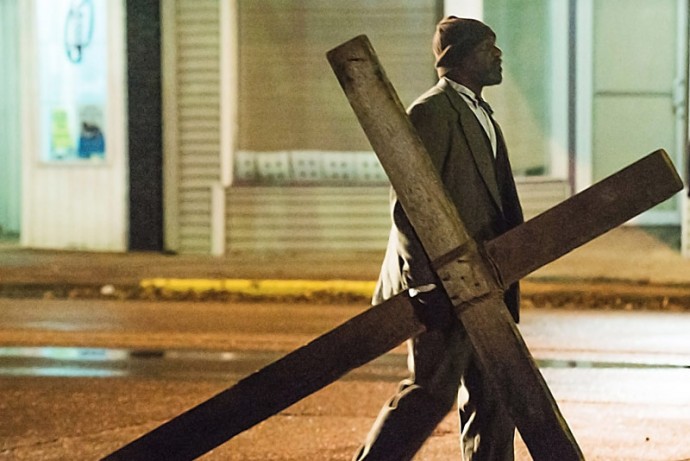If you read the reviews of “Do You Believe?”—the new Christian film from PureFlix—you will get a pretty good idea of whether you’re the movie’s intended audience. (Most of the reviewers, I think it’s safe to say, are not. See Rotten Tomatoes for a sampling of the critical scorn.) The film, a star-studded feature from the creators of 2014’s surprisingly profitable “God’s Not Dead,” is meant for Christians who want to see depictions of Christians helping the downtrodden of the world—and the downtrodden of the world getting their lives changed as a result.
Honestly, I don’t think that’s an entirely bad thing to want to see, provided one is a little bit self-reflective about it. (Just as one ought to be with one’s love of any movie genre known to have troubling tropes, which is to say: all of them.) “Do You Believe” offers itself pretty frankly as a Christian version of 2004’s “Crash.” Here, though, the car accident brings together a dozen Chicago souls in need of Jesus: an older couple (Cybill Shepherd and Lee Majors) who have lost a child, a mom (Mira Sorvino) and a daughter without a home, a veteran with PTSD, an EMT being persecuted for his faith, and more.
The plot is hamfisted, but criticizing the movie for having a contrived plot is like criticizing a Michael Bay film for having a lot of explosions. If you don’t like that kind of thing, you’re probably not who this movie was made for. And “Do You Believe?” is made for people who want to be inspired by a movie in which Christian belief and behavior works out for the best for everyone.
Presumably, that feels good; perhaps it gives them ideas for how they might live out their faith in the vastly more complicated real world.
Ah, but that’s the real problem. “Do You Believe?” is not up to the task of helping its viewers discern the differences between its movie-version of the world, and the world they live in. And that’s a big deal precisely because of the sort of movie it is. It’s not escapism or fantasy or documentary—that’s why criticisms about it being “preachy” are a little silly. It is, though, a movie pretty clearly intended to make Christians act a certain way toward the world they share with others. The deceit comes when “Do You Believe?” equates its version of Chicago with real-world Chicago, and by extension, the real world in general.
“Do You Believe?” hopes that its Christian viewers will come away thinking things like: all any problem really needs is a sincere, earnest Christian solution. In the United States, the filmmakers suggest, Christians are the only group of consequence being persecuted. Secular folks—or, really, any folks who don’t happen to be evangelical Christians—all feel personally affronted when a Christian couple prays before their meal in a restaurant. And perhaps most troubling: it’s definitely a good idea for a medical professional (an EMT, in this case) to proselytize an atheist patient who is critically injured. After all, who cares about the stress this could cause to the dying person, who now finds himself in the position of having to receive lifesaving care from someone who wants him to change his belief system? His soul is at stake. And anyone who prioritizes a different consideration—like allowing the critically injured person to retain some measure of control and psychological safety as he lies dying on the ground—is an enemy of Christianity.
(And apparently there are a lot of those around, because the EMT in question finds himself in court over “proselytization under the cover of authority.” Whether these are meant to be criminal or civil charges isn’t entirely clear in the context of the movie. I have not been able to find reference to them in the criminal or civil code of Illinois, where the movie is set. I did learn that many EMTs in Chicago are employed by private companies, in which case such an employee would not be violating the establishment clause by proselytizing.)
This is the movie’s big theological problem: a firm certainty that if it seems Christian to you, it probably is Christian, and is therefore a good thing in exactly the ways you think it’s a good thing.
Recall an oft-invoked criticism of first-person shooter games—that they immerse players in a virtual environment that feels very realistic, except that in this virtual world it’s a very good thing to try and kill as many people as possible. “Do You Believe?” is like that, only here one is meant to unleash Jesus on any situation whatsoever. No attention is paid to the possibility that even “Christian”-sounding convictions can be self-serving. The screenwriters do not entertain the possibility that being faithful means exercising discernment about whether you’re being a fool for Christ or an entitled jerkface.
Early in the movie a white Prius-driving pastor (played by Ted McGinley) has an encounter with a black street evangelist (played by Delroy Lindo). This encounter, we’re meant to conclude, shakes the mild-mannered minister from his complacency. The next night he tells his congregation about his encounter, saying that he was so moved by it, so shaken, that it can only have been the Holy Spirit. I don’t think I overstate things when I suggest that the screenwriters mean for us to interpret their movie by the same rubric. The movie moves us… or, well, it moves the people it was intended for. Aha, that must be the Holy Spirit at work!
Theologically, though, such a rubric is entirely wrongheaded. If my mind should generate some pious-sounding blurt, and if I should then find it enjoyable to inflict that blurt on other people, then sure, I might be saying something profound, compassionate, and truthful about God and human existence. On the other hand, I might just like how I sound when I say “The Lord loves you.” I might like how that lets me take up space in the room, how it lets me describe other people’s lives for them rather than listening to them, how it makes me come off as a good person in others’ eyes. I might actually be persecuted for my beliefs and that that is the most important instance of discrimination ever; on the other hand, perhaps I just enjoy thinking that I am. Maybe I find it gratifying.
And here’s the kicker: I am probably not in the best position to tell the difference. This isn’t some newfangled liberal fancy, either: since antiquity, Christian thinkers have dwelled on the human propensity to deceive oneself about one’s motives, especially where piety is concerned. The screenwriters, Cary Solomon and Chuck Konzelman, should know this. Heck, they’re Catholic!
One can (and should) say many things about how structures of power affect decisionmaking within the Catholic church, but it’s definitely not an everyone-for-themselves endeavor. Many schools of theological thought emphasize the need to discern communally, and to listen to one’s neighbors rather than to caricature them.
Ultimately, the offensive thing about “Do You Believe?” is not that it preaches, but that it preaches so poorly.



